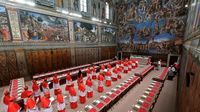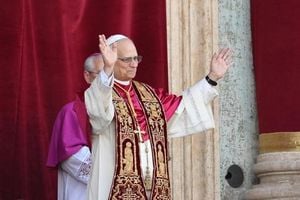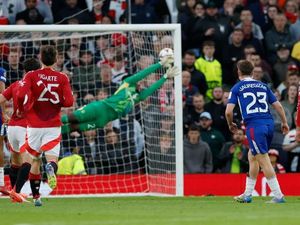On May 7, 2025, the conclave commenced to elect a successor to Pope Francis, who passed away on April 21 at the age of 88. This momentous event has sparked a flurry of myths and curiosities surrounding the selection of the new leader of the Roman Catholic Church. From prophecies predicting the emergence of a 'black Pope' to tales of a female pope in medieval history, the narratives swirling around this election are as captivating as they are complex.
As the conclave began, the atmosphere was charged with anticipation. A total of 134 cardinals under the age of 80 gathered in the Vatican to cast their votes, a process steeped in tradition and secrecy. Each day, they will vote until one candidate receives a two-thirds majority, with the results announced through smoke signals from the chapel's chimney. Black smoke on the first day indicated that a decision had not yet been reached.
One of the more sensational myths that has resurfaced with the passing of Pope Francis is the idea that the election of a 'black Pope' will herald the end of the world. This belief is rooted in a prophecy attributed to Nostradamus, which states: "By the death of a very old pontiff, a Roman of good age will be elected, of him it will be said that he weakens his seat, but he will be seated for a long time and in mordant activity." The notion has gained traction due to the presence of several Afro-descendant cardinals in the conclave.
Another intriguing story is that of 'Juana la papisa' or Pope Joan, a legendary figure who is said to have disguised herself as a man to ascend to the papacy between 855 and 857. According to the myth, her true identity was revealed when she gave birth during a procession, leading to her tragic demise. While this tale lacks historical verification, it has been perpetuated over the centuries, often cited to reinforce traditional gender roles within the Church.
The conclave's secrecy adds to the mystique of the papal election. Cardinals are isolated from the outside world during the voting process, a practice designed to prevent external influences. As Professor Anna Rowlands from Durham University points out, this tradition contrasts sharply with modern calls for transparency and accountability. Yet, it is precisely this isolation that intensifies the sense of responsibility and gravity that the cardinals feel as they deliberate.
As the days unfold, the drama of the conclave is expected to intensify. The cardinals, many of whom were appointed by Pope Francis himself, represent a diverse range of backgrounds and political perspectives. This diversity could lead to unexpected alliances and rivalries as they negotiate their way toward a consensus candidate. Approximately 80% of the voting cardinals were appointed in the last 12 years, reflecting Pope Francis's commitment to inclusivity and representation from developing countries.
The film "Conclave," which premiered earlier this year, has brought this ancient ritual into contemporary discourse. Adapted from Robert Harris's novel, the movie offers a dramatized glimpse into the intense political maneuvering that characterizes the election process. Nick Emerson, the film's editor, noted that it delves into the political machinations at play, portraying cardinals as individuals with ambitions and conflicts rather than mere religious figures.
"A conclave is something very, very human... It has a divine purpose, but it is very human," Rowlands explained, highlighting the blend of spirituality and earthly concerns that defines the election. The film captures the claustrophobic environment of the conclave, where cardinals must navigate their own interests while remaining committed to the Church's mission.
As the conclave progresses, the world watches with bated breath. The first white smoke signals, indicating the election of a new pope, will be met with jubilation and tears from the faithful gathered in St. Peter's Square. On May 8, 2025, as the crowd erupted in joy at the sight of white smoke, the atmosphere was electric. Approximately 20,000 people filled the square, waving flags from various countries, their excitement palpable as they awaited the announcement of the new leader.
"Habemus Papam!" the crowd shouted, celebrating the election of a new pontiff. The announcement is not just a transition of leadership; it symbolizes hope and renewal for millions of Catholics around the globe. As the new pope steps onto the balcony of the Loggia Central, he is expected to address the faithful, echoing the sentiments of Pope Francis about unity and compassion within the Church.
The conclave and its surrounding myths reflect the deep historical roots and evolving dynamics of the Catholic Church. Whether through stories of prophetic significance or the legendary figure of Pope Joan, these narratives speak to the ongoing fascination with the papacy and its role in a rapidly changing world. As the Church prepares to welcome its new leader, the anticipation surrounding this election underscores the profound impact that the papacy holds in both spiritual and secular realms.
With the conclave set to continue over the coming days, observers will keenly watch for developments, both in the voting process and in the myths that continue to captivate the imagination of believers and skeptics alike. The intersection of faith, history, and modernity will undoubtedly shape the future of the Catholic Church as it embarks on this new chapter.





